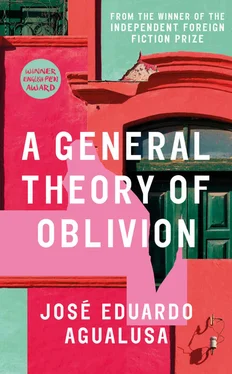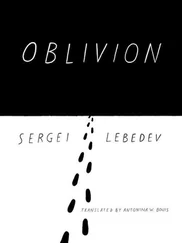The journalist classified the disappearances on a scale from one to ten. The five planes that disappeared from the skies above Angola, for example, were categorised by Benchimol as grade-eight disappearances. The Boeing 727, a grade-nine disappearance; Simon-Pierre Mulamba too.
Mulamba disembarked in Luanda on 20 April 2003, at the invitation of the Alliance Française, for a conference on the life and work of Léopold Sédar Senghor. Tall, distinguished-looking, never without his beautiful felt hat, which he wore tilted just slightly to the right with studied indifference. Simon-Pierre liked Luanda. It was the first time he’d visited Africa. His father, a teacher of Latin dance, native of Ponta Negra, had told him about the heat, the humidity, warned him of the dangers of the women, but hadn’t prepared him for this excess of life, for the merry-go-round of emotions, the intoxicating tumult of sounds and smells. On the second night, right after his lecture, the writer accepted an invitation from Elizabela Montez, a young architecture student, to have a drink at one of Ilha’s smartest bars. The third night he spent dancing mornas and coladeiras in the backyard of some Cape Verdeans in Chicala, in the company of two of Elizabela’s girlfriends. On the fourth night he disappeared. The French cultural attaché, who had arranged to meet him for lunch, went in search of him at the lodge where they had put him up, a really lovely place, close to the Barra do Kwanza. Nobody had seen him. There was no answer on his cell phone. In his room, the bedcovers had not yet been pulled back, the sheets still stretched tight, a chocolate on the pillow.
Daniel Benchimol learned of the writer’s disappearance before the police. He only needed two telephone calls to discover, with a considerable amount of detail, where and with whom Simon-Pierre had spent his first nights. Two more calls and he knew that the Frenchman had been seen at five in the morning leaving a disco in the Quinaxixe market, a place frequented by European expats, slutty teenage girls, and poets with rather more interest in pursuing the booze than the muse. That night, Benchimol went to the disco himself. Fat, sweaty men were drinking in silence. Others, half hidden in the dark, stroked the bare knees of girls who were very young. He particularly noticed one of the girls because she was wearing a black felt hat with a thin red ribbon. He was about to approach her when a blond guy with his long hair tied into a ponytail gripped his arm:
‘Queenie’s with me.’
‘Don’t worry. I’ve just got a question I want to ask her,’ Daniel reassured him.
‘We don’t like journalists. Are you a journalist?’
‘Sometimes, pal, it depends. I mostly feel Jewish, though.’
The other man let go of him, confused. Daniel greeted Queenie:
‘Good evening. I just wanted to know where you got the hat.’
The girl smiled:
‘The French mulatto who was here yesterday, he lost it.’
‘He lost the hat?’
‘Or the other way round, he’s the one who was lost. The hat found me.’
She explained that the previous night, a group of boys, those ones who live out on the street, had seen the Frenchman leave the club. He had stopped to urinate after a few metres, around the back of a building, and then the earth had swallowed him up. All that was left was the hat.
‘The earth swallowed him up?’
‘That’s what they’re saying, old man. It could be quicksand, it could be witchcraft, I don’t know. The boys pulled the hat out with a stick. I bought the hat from them. It’s mine now.’
Daniel left the disco. There were two boys watching television, sitting on the pavement in front of a shop window. The sound from the television didn’t reach outside, so the two of them were improvising the dialogue for each of the actors in turn. The journalist had seen the film before. The new dialogue, however, had transformed the plot entirely. He spent a few minutes enjoying watching the show. He took advantage of a break to speak to the boys:
‘I’ve heard there was a guy, a French guy, who disappeared near here last night. They say he was swallowed up by the earth.’
‘Yes,’ one of the children confirmed. ‘These things happen.’
‘Did you see it?’
‘No. But Baiacu saw it.’
Daniel questioned other boys in the days that followed, and all spoke of Simon-Pierre’s sad end as though they had witnessed it. Then, when pressed, they acknowledged that they had not been there. Certainly nobody saw the French writer again. The police filed the case.
There is only one grade-ten disappearance on the Benchimol Scale. The journalist witnessed that remarkable loss himself. On 28 April 1988 the Jornal de Angola , the newspaper for which Daniel was working, sent him to a small town called Nova Esperança, where twenty-five women had been murdered under suspicion of witchcraft. He was accompanied by a photographer, the famous Kota Kodak, or ‘KK’. The two journalists disembarked from a commercial airliner at Huambo airport. There was a driver waiting to take them to Nova Esperança. Once they were there, Daniel chatted to the chieftain and various members of the tribe. KK took their portraits. It was getting dark when they got back to Huambo. They were due to return to Nova Esperança the following morning, in an air-force helicopter. The pilot, however, proved unable to locate the village.
‘It’s weird,’ he confessed, troubled, after two hours of wandering the skies. ‘There’s nothing at those coordinates. Nothing down there but grass.’
Daniel became impatient at the young man’s ineptitude. He hired the same driver who’d first taken them there. KK refused to go with them:
‘There’s nothing to take pictures of. You can’t photograph absences.’
They went round and round in the car, revisiting the same landscapes, as in a dream, for that infinite length of time that a dream can occupy, until the driver, too, admitted his embarrassment:
‘We’re lost!’
‘We? You’re the one who’s lost!’
The man turned to face him in a rage, as though he thought him responsible for the lunacy of the world:
‘These roads are more and more muddled.’ He was pummelling the steering wheel hard. ‘I think we’ve had a geographical accident!’
Suddenly, a bend loomed up in the road and they emerged from the mistake, or the illusion, dazed and trembling. They did not find Nova Esperança. A signpost did, however, return them to the highway, which in turn took them back to Huambo. KK was waiting at the hotel, arms crossed across his thin chest, a dark expression on his face:
‘Bad news, partner. I developed the film and it’s all burned out. All the gear’s complete crap. Gets worse every day.’
No one on the paper seemed concerned at the news that Nova Esperança had disappeared. The editor-in-chief, Marcelino Assumpção da Boa Morte, just laughed:
‘The village disappeared? Everything’s always disappearing in this country! Perhaps the whole country is in the process of disappearing, a village here, a village there. By the time we notice there’ll be nothing left at all!’
In 2003, a few weeks after the mysterious disappearance of the French writer Simon-Pierre Mulamba, to which the Angolan newspapers gave a certain prominence, Marcelino Assumpção da Boa Morte called Daniel into his office. He held out a blue envelope:
‘I’ve got something for you here, seeing as you collect disappearances. Read this. See if there might be a piece in it.’
Dear Managing Director of the Jornal de Angola ,
My name is Maria da Piedade Lourenço Dias and I’m a clinical psychologist. About two years ago I discovered an awful truth: I was adopted. My biological mother handed me over for adoption immediately after my birth. I was confused, and decided to investigate why she did it. Ludovica Fernandes Mano — that is my biological mother’s name — was brutally raped by a stranger in the summer of 1955, and became pregnant. Following this tragic event, she always lived in the house of an older sister, Odete, who in 1973 married a mining engineer, based in Luanda, called Orlando Pereira dos Santos.
Читать дальше












